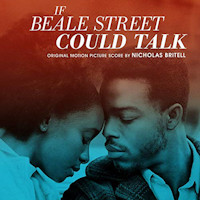- Composed by Nicholas Britell
- Lakeshore / 53m
From Moonlight director Barry Jenkins, If Beale Street Could Talk is an acclaimed film based on James Baldwin’s novel based in Harlem in the early 1970s and follows a young woman’s attempt to clear her husband’s name before their child is born. Jenkins teams up again with composer Nicholas Britell for the score. The main theme, “Eden”, appears in several guises on the album. The first – subtitled “Harlem” – reveals it to be a warm, melancholy piece. A gentle melody is carried by strings – full of melancholy, it’s a bold and powerful piece. Elsewhere Britell sometimes adopts a jazz/orchestral style which is frequently very understated – like a softer version of Taxi Driver, I thought the first time I heard it – the jazz influence coming in more from the harmonies than anything else – in cues like “The Children of Our Age” and “Mrs Victoria Rodgers”.
More commonly though, this is romantic music. Virtually throughout there is this very yearning, affectionate quality to it – the film is after all ultimately a love story, albeit not one without real challenge – and it has a very personal, moving quality. It’s not sweeping romance in the John Barry sense – it’s much smaller-scale in terms of the orchestral forces, most obviously – and while you could say it’s somewhat repetitive on the album, the darker moments do provide the offset that is so often so powerful in strengthening the impact of the emotional material. There is a clarity to the orchestration (even if it is not entirely conventional) and also the performance and recording which gives the album a certain raw directness which is very impressive. Interestingly, one of the bonus tracks (“Harlem Aria”) presents the original vision the composer and director had for the score – it’s entirely brass – I’m sure they made the right decision for the film in adding the string dominance but it’s a very impressive piece of music. Britell seems to fall under the radar a little but I’ve been very impressed with him recently – Battle of the Sexes was a great score, his theme for the tv show Succession is one of the best I’ve heard in ages – I imagine this score will attract a lot of attention from the awards bodies (and there is also a strong vibe surrounding the imminent Vice) – he is clearly a serious, and seriously talented, film composer.
Rating: ****
facebook.com/moviewave | twitter.com/MovieWaveDotNet | amazon.com












Really like this score, but you’re right, many of the cues feel similar. Keen to listen to Vice soon, hearing good things about that one.
A beautiful and touching score. I agree that there is a lot of repetition but that is understandable considering Britell credits Phillip Glass as one of his inspirations. However, hushed squeals and fluttering callsof the trumpets echoes some of Ennio Morricone’s softer themes. Maybe that’s why I love it so much. But it fits with the story so well. As explained at the beginning of the film, Beale Street is the universal black experience. This powerful love story is merely a snapshot of that experience. It is one story in a deep ocean of history, which focuses a soft but powerful light on the legacy of injustice committed upon the African American community. Their young love is a persistent current. Britell lends to it with the ebb and flow of strings. The repetition in the score is like the endless beating heart of these two star crossed lovers. The entire mood of the score resembles a deep inner churning of emotion. From the warm floating touches of Agape to the thundering pulse of Hypertension, Britell’s tracks appropriately capture the soul of the characters as they navigate the rough waters seeking to drown their love. The faint nature of the brass instruments recalls a sensation of shouting in the dark, as if calling out to others. It gives the sense of an overwhelming feeling of love desperately calling out, yearning to hear “I’m still here”. His soundtrack is an appropriate vehicle for the brief whisper that is this small tale of love. His songs are hauntingly romantic at times and frighteningly familiar and real when conveying the pain and fear as darkness tries to tear apart their love. It is a soundtrack and a talent that certainly deserves to be recognized if not for the individual talent but for the mastery of capturing the essence of the film and it’s characters.